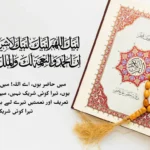The verse لَا إِلَهَ إِلَّا أَنْتَ سُبْحَانَكَ إِنِّي كُنْتُ مِنَ الظَّالِمِينَ is one of the most profound supplications mentioned in the Quran. Known as the Dua of Prophet Yunus (AS), it carries immense spiritual and emotional significance for Muslims.
This article explores the meaning, context, and benefits of this dua, along with its relevance in daily life.
| Kullu Nafsin Zaikatul Maut Thumma ilayna Turjaoon |
| Bismillahi Tawakkaltu Alallah Dua with Meaning |
| Summun Bukmun Umyun Fahum Layarjiun |
| Hasbi Allah dua | Allah Is Sufficient For Me |
1. Arabic Verse, Transliteration, and Translations
Arabic:
لَا إِلَهَ إِلَّا أَنْتَ سُبْحَانَكَ إِنِّي كُنْتُ مِنَ الظَّالِمِينَ
Transliteration:
La ilaha illa anta subhanaka inni kuntu minaz zalimin
English Translation:
“There is no deity [worthy of worship] except You; exalted are You. Indeed, I have been of the wrongdoers.”
Urdu Translation:
“آپ کے سوا کوئی معبود نہیں ہے، آپ پاک ہیں، بے شک میں ظالموں میں سے ہوں۔”
2. Context of the Dua
This powerful supplication was made by Prophet Yunus (AS) when he found himself trapped in the belly of a whale. Realizing his mistake and the greatness of Allah, he turned to Him in absolute humility, acknowledging his error and seeking forgiveness.
This dua is not just a plea for rescue but a declaration of Allah’s oneness (Tawhid), His perfection (Tasbeeh), and a confession of human fallibility.
3. Meaning and Analysis of Each Phrase
a. La ilaha illa Anta (لَا إِلَهَ إِلَّا أَنْتَ)
Translation: “There is no deity [worthy of worship] except You.”
This opening phrase is a declaration of monotheism (Tawhid). It affirms that Allah is the only one worthy of worship, the Creator, Sustainer, and Controller of all affairs.
b. Subhanaka (سُبْحَانَكَ)
Translation: “Exalted are You.”
This is an acknowledgment of Allah’s perfection, free from all imperfections and deficiencies. It reflects the believer’s recognition of Allah’s greatness.
c. Inni Kuntu Minaz Zalimin (إِنِّي كُنْتُ مِنَ الظَّالِمِينَ)
Translation: “Indeed, I have been of the wrongdoers.”
Here, the supplicant confesses their shortcomings and mistakes, demonstrating humility and a willingness to repent. This act of self-accountability is a key to attaining Allah’s mercy and forgiveness.
4. Lessons from the Dua
- The Power of Tawhid: This dua reminds us of the central tenet of Islam—belief in the oneness of Allah.
- Acknowledgment of Mistakes: True repentance begins with admitting one’s faults and seeking forgiveness.
- Turning to Allah in Distress: No matter how dire the situation, calling upon Allah with sincerity can bring relief and guidance.
5. Benefits of Reciting This Dua
- Forgiveness of Sins: The dua is a form of Istighfar (seeking forgiveness).
- Removal of Hardships: Just as Allah rescued Prophet Yunus (AS), He can ease the difficulties of those who sincerely recite this dua.
- Spiritual Connection: Reciting this supplication strengthens faith and reliance on Allah.
6. How to Incorporate This Dua into Daily Life
- Morning and Evening Remembrance: Add this dua to your daily adhkar (remembrances) to seek Allah’s protection and forgiveness.
- During Hardships: Whenever you face challenges, recite this dua with full conviction in Allah’s mercy.
- In Salah (Prayer): Include this dua in your prostration (sujood), as it is a moment of closeness to Allah.
7. Relevance in Modern Times
In today’s fast-paced life, many feel overwhelmed by challenges and mistakes. This dua serves as a reminder to turn back to Allah, no matter how far one feels they have strayed. It offers hope and reassurance of Allah’s mercy.
FAQs:
This dua emphasizes Allah’s oneness, His perfection, and the need for human repentance. It was recited by Prophet Yunus (AS) in his moment of distress and is a source of immense blessings and forgiveness.
This dua can be recited at any time, especially during hardships or as part of daily supplications. It is particularly effective when seeking forgiveness or relief from difficulties.
Yes, reciting this dua with sincerity and belief can bring relief, as it invokes Allah’s mercy and forgiveness, as exemplified by the story of Prophet Yunus (AS).
Conclusion
The supplication “lailaha illa anta subhanaka inni kuntu minaz zalimin” is a powerful reminder of Allah’s mercy and the importance of humility and repentance. By incorporating this dua into our daily lives, we can strengthen our faith, seek forgiveness, and find solace in Allah’s infinite mercy.
May Allah grant us the wisdom to recite this dua with sincerity and accept our prayers. Ameen.




